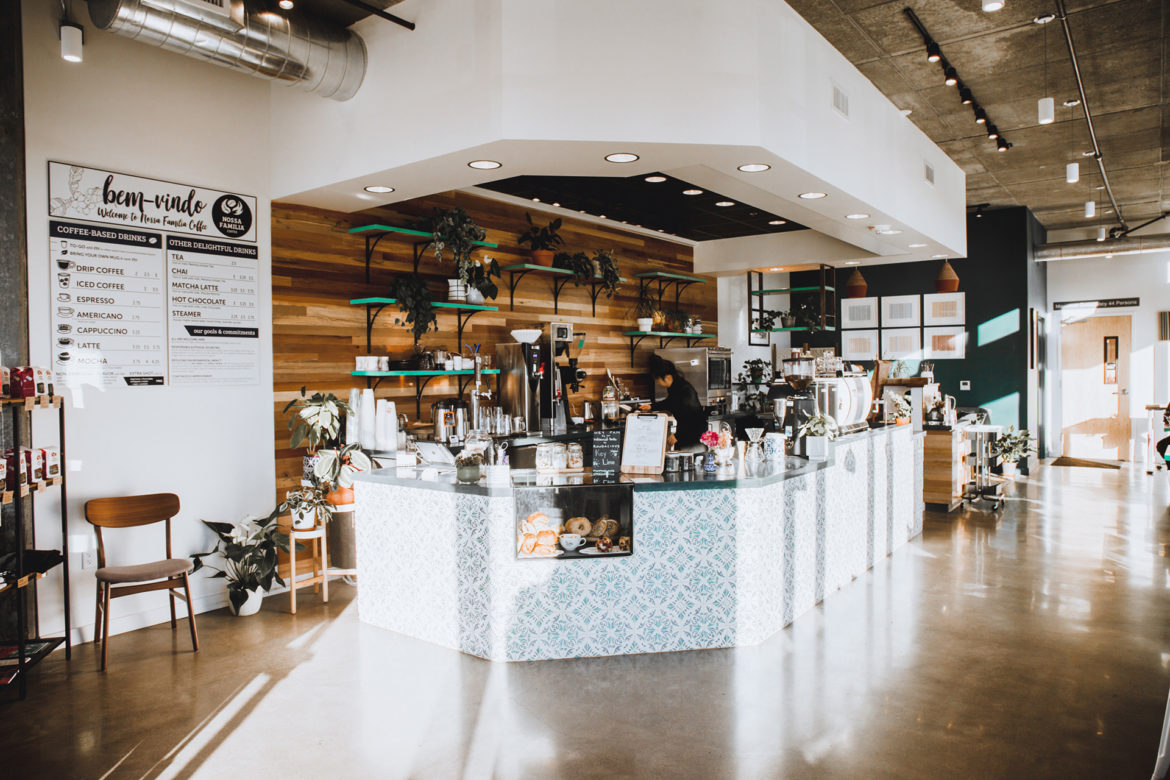
Photo by Cortney White.
While many of late have framed disability inclusion and waste reduction as diametrically opposed, Portland’s Nossa Familia, a local institution since 2004, is using its newest space to showcase a unique and beautiful combination of the two. Nossa Familia, which means “our family” in Portuguese, designed its latest cafe around the idea that anyone should feel welcome in their space, focusing on making it accessible to all types of bodies while reducing waste in ways that help the environment without harming their clientele.
The new cafe, which opened in late 2018, resides in the Seven Corners Collaborative, a community hub for several local nonprofits that all work in the disability services arena—the space brings several key services under one roof in order to increase access and reduce travel for clients with disabilities. Community Vision, a longtime partner of Nossa Familia asked Nossa to join the hub with a new cafe. “We were both excited and challenged by the opportunity, and we thought very critically about the community we were coming into,” said Karen Lickteig, marketing director for Nossa.
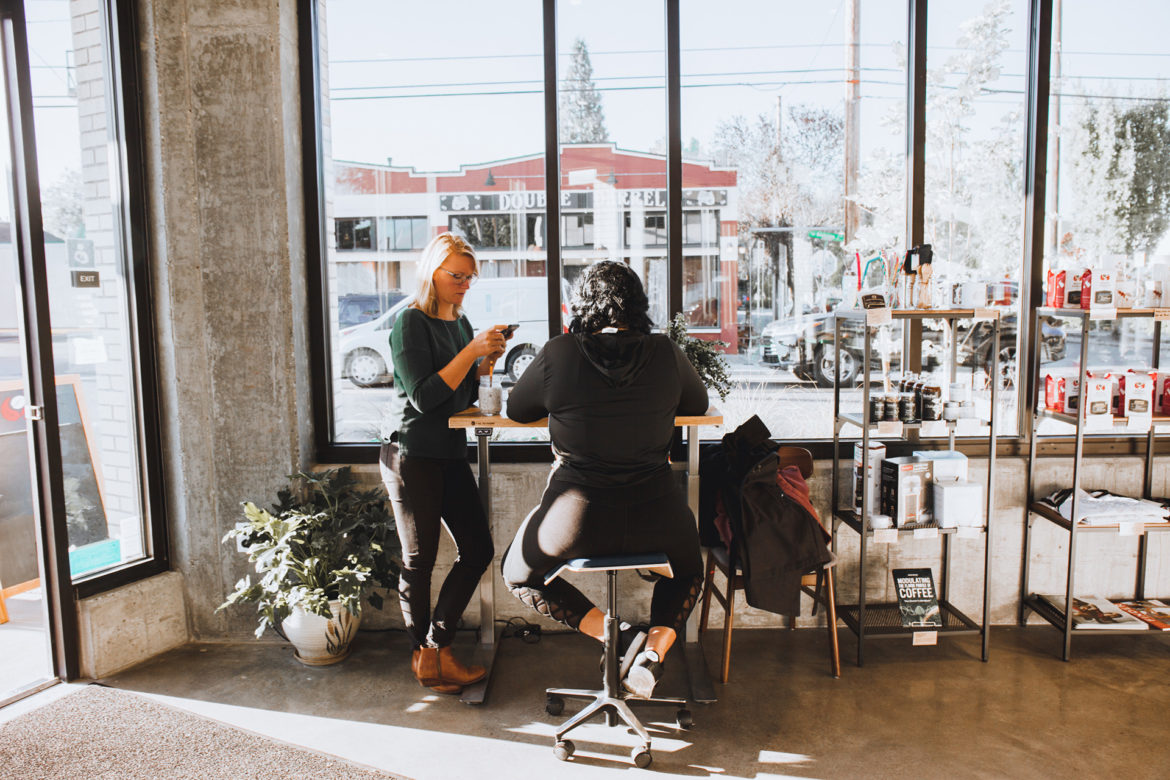
In order to ensure that the space served the community for whom it was built, Nossa’s team did a lot of research and had many conversations with the Community Vision team and clientele. Utilizing the principles of Universal Design, they worked to make the space welcoming to all by being conscious of space and layout, including table height, creating more open spaces, incorporating lower counters and ADA-height equipment, choosing stools, chairs, and tables that accommodate different bodies and abilities, and generally trying to create a more flexible space. In addition to making sure the space is comfortable for people with disabilities, cafe supervisor Camille Bevans also helped focus them towards making sure it was equally comfortable for people with larger bodies who don’t have disabilities. “Our menu in this cafe says ‘All Are Welcome Here: We strive for this space to be a welcoming and comfortable space for all,’” said Lickteig. “It’s really that simple—we just want to do our part to create a positive experience for every customer, no matter who they are, where they come from, what they look like, or whatever their abilities are. We really want to make people feel ‘at home’ in our cafes, like they’re a part of our familia too.”
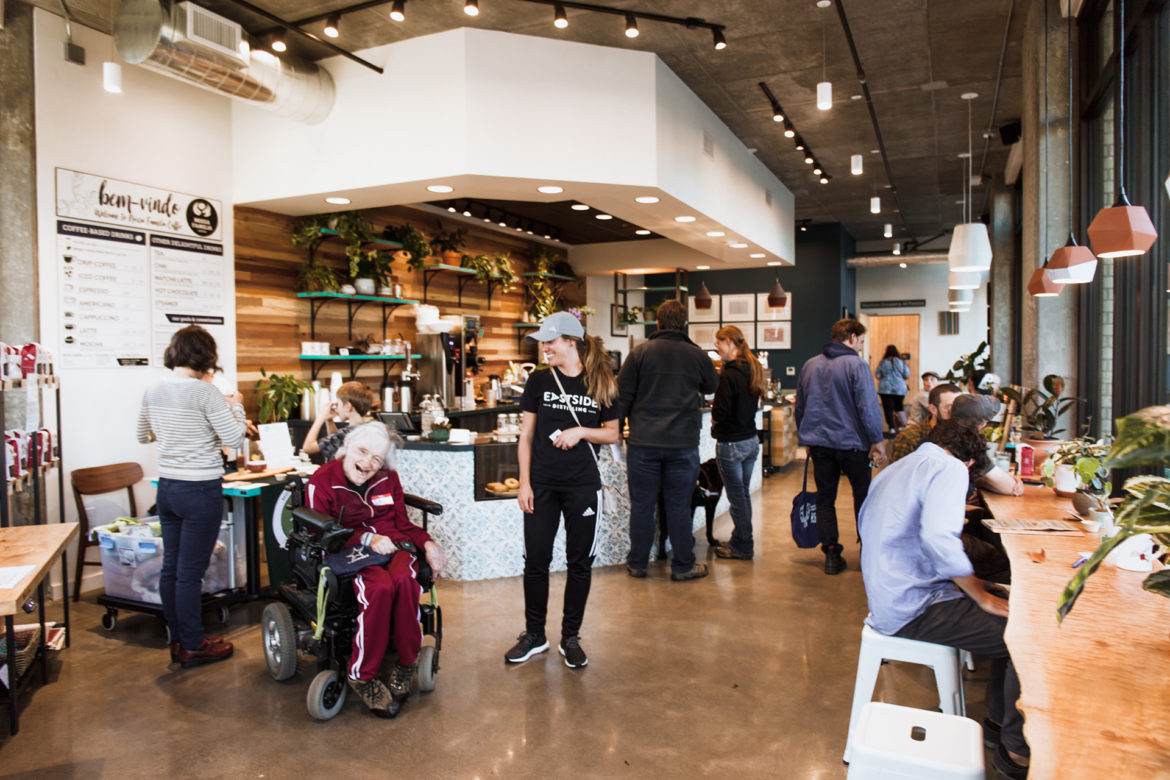
Photo by Cortney White.
In addition to considering the interpersonal impact, the Nossa team also prioritizes sustainability, which, according to Lickteig, has been a focus of the company from day one. “Ever since Augusto [Carvalho Dias Carneiro] founded the company, he’s looked for ways to reduce impact on the environment,” she said, citing examples of working with lower-emission Loring roasters and pursuing B-corp status. As they’ve expanded into retail, they’ve started to challenge themselves to push for sustainability in that realm as well. “We’ve always been troubled by the thousands of cups that are sent to the landfill as a direct byproduct of our business and we feel responsible for the production and reduction of that waste. We are working to bring more care and consciousness to this and asking our customers to share the responsibility as well,” said Lickteig.
In their Seven Corners Cafe, Nossa Familia has several waste-reduction initiatives in place, which have been vetted by the Community Vision staff and clientele to make sure they don’t decrease disability access to the space. They keep recycling, trash, and compost behind the counter and separate these themselves. They encourage the use of for-here cups and dining both through customer service and through a 25 cent upcharge for to-go, and when customers do need to-go cups, they’re all compostable. They offer metal silverware instead of plastic and are happy to apply cream cheese for customers taking bagels to go. They also sell reusable everything, at cost in the case of their reusable straw option, which was specifically vetted to make sure it’s as functional as a plastic bendy straw for customers with disabilities. When they hold events or pass out samples, they do those with for-here equipment and just increase the number of dishes they wash, while waiting until the dishwasher is completely full before washing the dishes. They also encourage vendors to deliver in reusable plastic Tupperware.
On Earth Day 2019, Nossa expanded the 25 cent upcharge to include all of the company’s three Portland cafes, with a 25 cent discount also offered for customers who bring their own reusable cups.
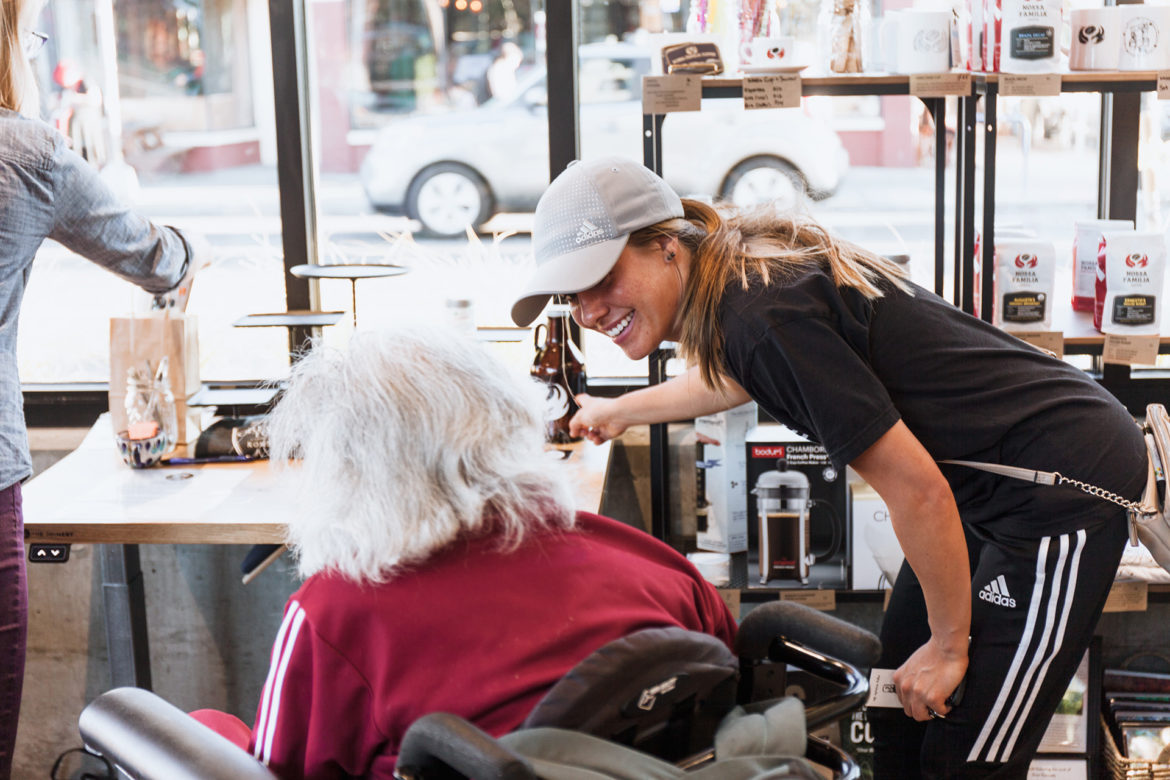
Photo by Cortney White.
According to cafe manager Bevans, they’re always in the process of finding more ways to use customer service to reduce waste as well as navigating issues like the complexity of finding an ideal to-go straw for customers who currently only feel comfortable using disposable plastic ones. Bevans has watched customers initially question why certain things aren’t available, only to come back with changed habits, like bringing their own cups and straws. “It’s fun to watch it dawn on people that many things we are used to in the single-use plastic world are things that we really don’t need,” she said. “I’ve received many heartfelt ‘thanks for doing your part!’ for not having plastic knives or ramekins. So far all of our to-go bagel customers are more than happy with the solutions we have offered them.”
Currently, though, the cafe does not offer disposable plastic bendy straws for to-go customers with disabilities, a policy I questioned. “To be clear, we do have straws available to everyone,” said Bevans. “We have for-here straws and we have reusable straws for sale at $1 each or $3 each depending on the type. On more than one occasion, baristas have chosen not to upcharge, or to give a reusable straw away for free if it looks like the person needs one. Our company is all about caring and building trust and we empower baristas to make this call.”
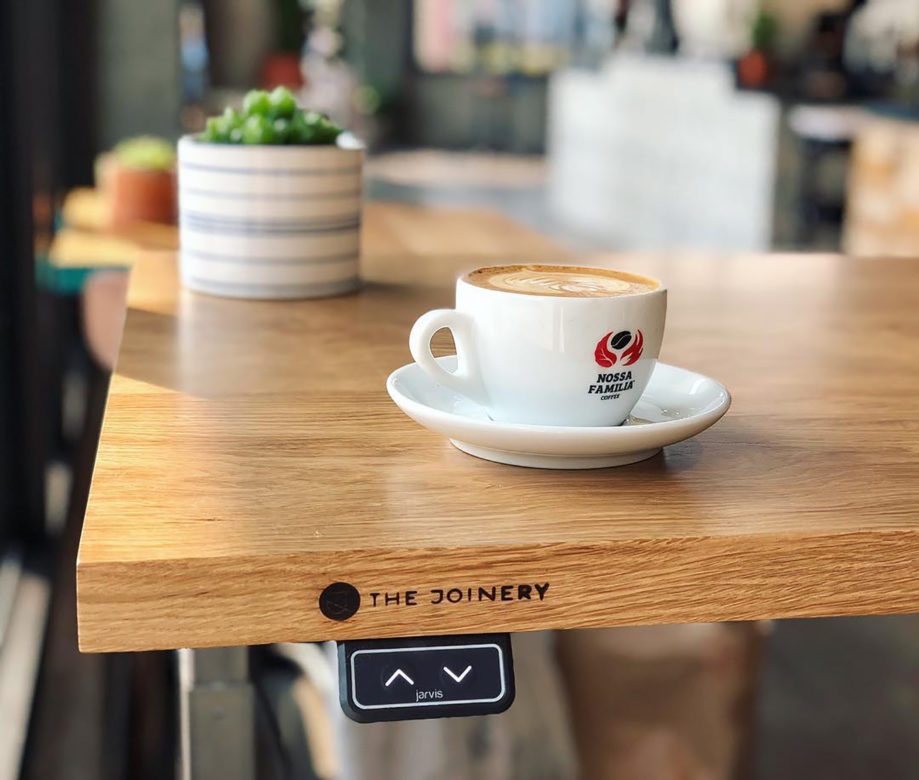
Photo by Cortney White.
Lickteig is also grateful for the conversations they’ve been able to have with their community to improve the space, as well as to the baristas who navigate these conversations and use customer service to cover gaps in consumer habit. “It’s been a great asset having Community Vision’s Assistive Technology Lab next door to us in the building, and we’ve been able to learn from their expertise in terms of Universal Design and Inclusive Design.” In order to remain flexible based on feedback, all furniture for the new space is rented. “That way, we can switch things up based on feedback and what customers like or want to see there,” said Lickteig.
Owner and founder Augusto Carvalho Dias Carneiro hopes their space can provide an example for others. “Hopefully with our example, people can approach [sustainable, accessible practices] with less fear of doing damage to their business.”
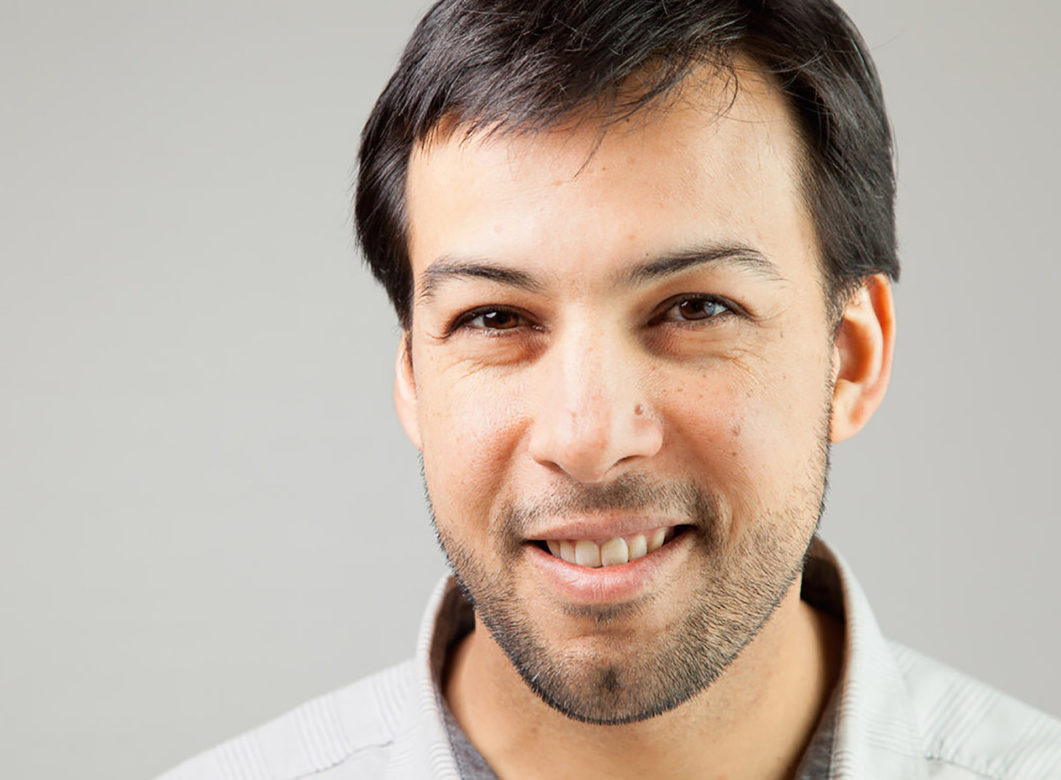
Founder/owner Augusto Carvalho Dias Carneiro.
“Specialty coffee as an industry was founded on the idea of questioning long-held assumptions about coffee that were damaging to people and the environment, in favor of a new way of operating that imbued our work with more transparency and sustainability,” said Lickteig. “As an industry, we need to rethink some of the things we’ve done for a long time and unite around innovative ideas for making a positive impact together.
Just as the Seven Corners Collaborative building itself is a model for accessible buildings, we hope our cafe can also be a model to others, showing that sustainability and accessibility can be beautiful, elegant, and functional.” As Seven Corners shows, accessibility and sustainability make a great team.
Nossa Familia is located in the Seven Corners Community Collaborative at 1949 SE Division St, Portland. Visit their official website and follow them on Facebook, Twitter, and Instagram.
RJ Joseph (@RJ_Sproseph) is a Sprudge staff writer, publisher of Queer Cup, and coffee professional based in the Bay Area. Read more RJ Joseph on Sprudge Media Network.
Photos provided by Nossa Familia.
The post In Portland, Reducing Waste And Increasing Accessibility At Nossa Familia appeared first on Sprudge.

